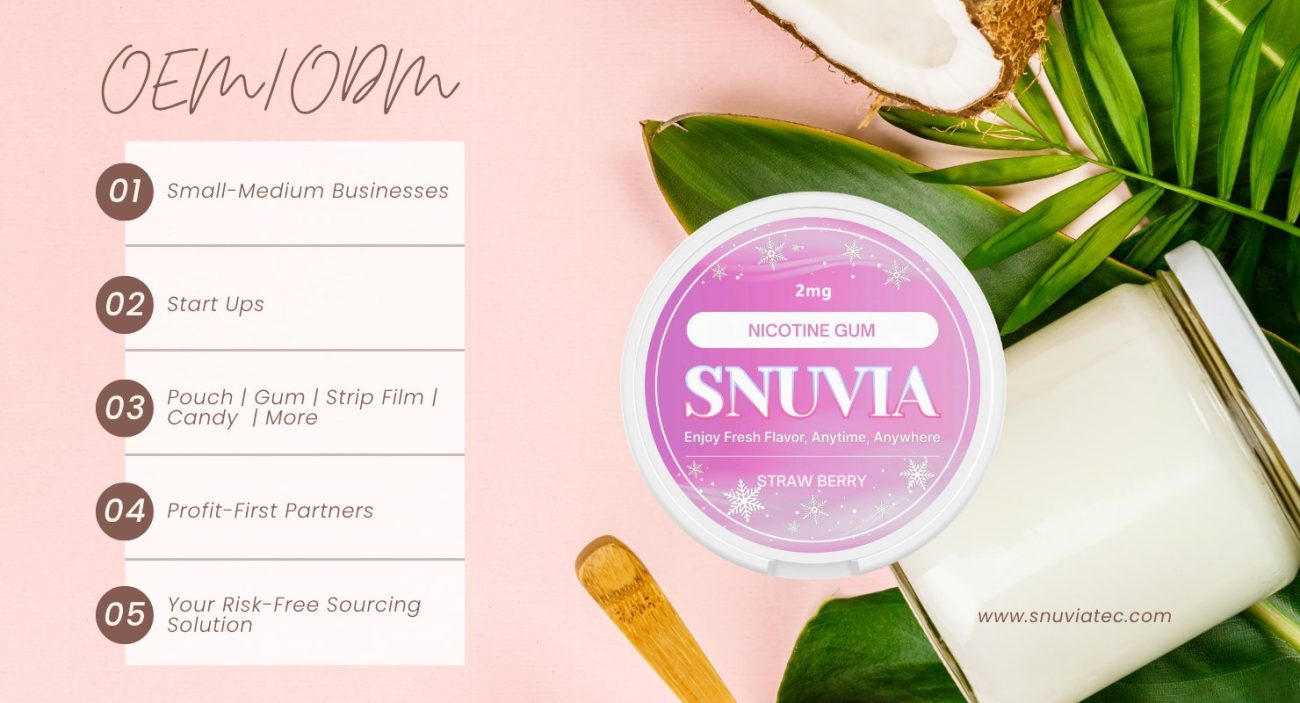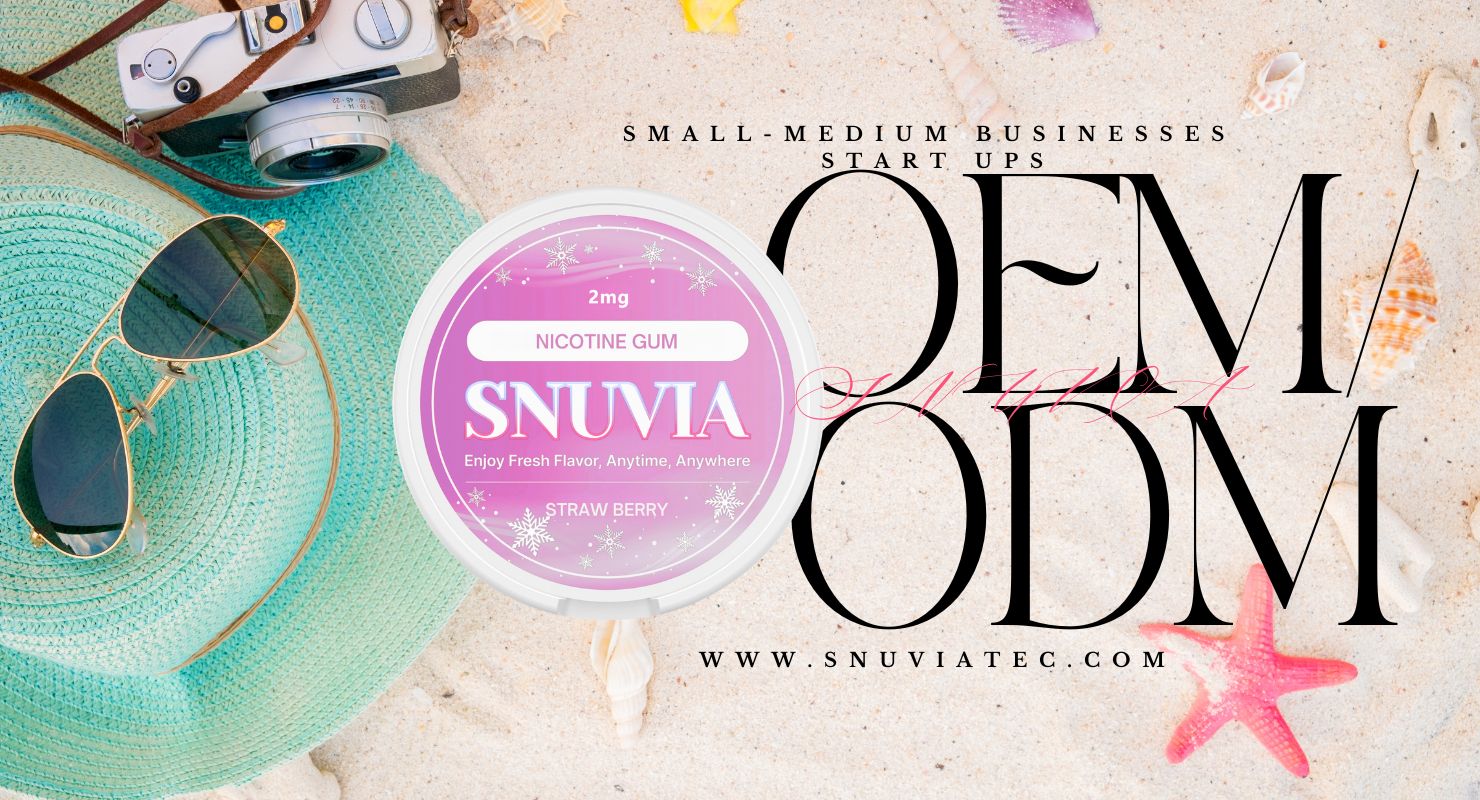For distributors and agents navigating the smoking cessation market, understanding nicotine gum price structures is critical to maximizing margins and capturing market share. As a leading nicotine gum manufacturer, SNUVIA combines China’s manufacturing efficiencies with premium quality to deliver competitive wholesale pricing. This guide unpacks the complexities behind pricing—from raw materials to retail markups—and offers data-driven strategies to help you leverage global opportunities.
Understanding the Components of Nicotine Gum Pricing
Beyond Raw Materials: Key Cost Drivers Explained
While nicotine API (Active Pharmaceutical Ingredient), flavors, and packaging form the base cost (~40% of total), R&D and regulatory approvals significantly impact pricing. For instance, FDA/CE certifications require 12–18 months of stability testing, adding 15–20% to development costs.
Economy of Scale: How Volume Impacts Unit Cost
Producing 1 million units vs. 100,000 can reduce per-unit costs by 30–50% due to bulk API purchasing and optimized production runs. SNUVIA’s MOQs start at 50,000 units to help distributors access economies of scale.
The True Cost of Quality & Compliance
Non-compliance risks like FDA recalls can cost up to $500,000 per incident. SNUVIA’s GMP-certified facilities (ISO 13485) mitigate this through rigorous batch testing, ensuring consistent dosing and bioavailability.
Global Snapshot: Nicotine Gum Price Variations Explained
Regional Cost Differences: Manufacturing Base & Local Factors
Labor costs drive stark disparities:
- EU/US production: 25–35/hour wages vs. China’s 5–8/hour.
- China’s efficiency enables 20–30% lower wholesale nicotine gum prices for distributors, leveraging scale and integrated supply chains.
Currency Fluctuations & International Pricing
A 10% USD/EUR swing can alter landed costs by 8–12%. For example, a stronger dollar benefits Eurozone buyers but pressures emerging-market importers.
Import Duties & Taxation: Hidden Costs
Tariffs vary sharply:
- USA: 6.5% for NRT products
- Brazil: 18%
Maine’s 42% nicotine pouch tax highlights regulatory risks. These “invisible” fees can erode 15–20% of margins if unaccounted for.
Wholesale Nicotine Gum Prices: The Distributor Advantage
Defining Wholesale Pricing & Tiered Discount Structures
Wholesale pricing slashes per-unit costs significantly—e.g., Nicorette 160-count packs retail at 25–48 on eBay, but distributors secure volumes like Habitrol’s 384-count at 72(0.19/unit). Tiered discounts reward scale: orders over 100,000 units often cut prices by 15–20%.
MOQ & Its Direct Effect on Price
Lower MOQs (e.g., 50,000 units vs. Nicorette’s 200,000+) empower smaller distributors. Bulk orders (like Kirkland’s 380-piece box at $31.53)reduce costs by 30% through economies of scale.
Long-Term Value of Stable Contracts
Locking in annual contracts shields against market volatility—ensuring consistent pricing even amid currency shifts or supply disruptions. For instance, distributors partnering with reliable factories avoid the 8–12% cost swings seen in spot markets.
China Manufacturing Power: Unlocking Superior Nicotine Gum Wholesale Prices
Comparative Cost Analysis: China vs. EU/US Production
Labor costs in China (5–8/hour) are 60–70% lower than in the EU/US (25–35/hour), while energy and facility overheads are 40–50% cheaper. This structural advantage enables 20–30% lower wholesale prices for distributors sourcing from Chinese factories like SNUVIA.
Efficiency & Scale: Integrated Factories Drive Down Costs
Vertically integrated production—from API synthesis to flavor encapsulation and packaging—slashes lead times to 30 days (vs. 60–90 days in fragmented supply chains). Bulk raw material procurement (e.g., 100,000+ unit MOQs) further reduces per-unit costs by 25–30%.
Robust Supply Chain: Mitigating Disruption Risk
Localized sourcing of ingredients (e.g., mint flavors from Guangdong) and multi-regional logistics hubs cut shipping delays. During 2024’s port strikes, Chinese factories maintained 99% on-time delivery vs. 72% for EU counterparts—stabilizing prices amid volatility.
Retail Nicotine Gum Prices: From Wholesale to Shelf
The Markup Journey: Distributor Margins & Retailer Markups
Wholesale prices (e.g., 0.18–0.25/unit) rise by 30–40% for distributors and 50–70% for retailers. For instance, Nicorette’s 0.25/unit wholesale cost becomes0.50–$0.60 retail—a 100%+ markup.
Online vs. Offline Price Differences
E-commerce platforms like Amazon sell Rite Aid gum at 0.24–0.26/piece (100-ct for 25.99),while pharmacies charge 0.40–$0.50/piece due to higher overheads. Seasonal discounts (e.g., Boots’ “buy 2, save 50%”) further widen gaps.
Brand Positioning & Packaging Influence
Premium brands command 20–30% higher prices than generics via clinical branding and bulk packaging (e.g., 105-ct vs. 20-ct). Value packs (e.g., 384-ct Nicotinell for £17.47) reduce per-unit costs by 40%, appealing to budget-conscious buyers.
Price Battle: Nicotine Gum vs. Nicotine Pouches
Direct Cost Comparison: Production & Materials
Nicotine gum production costs 20–30% higher than pouches due to complex chewing matrix ingredients (gum base, glycerin) vs. pouches’ synthetic nicotine + fiber blend. Example: VELO nicotine pouches wholesale at 4.99/can (20pouches) vs. RiteAidgum at 0.31/piece (100-ct for $30.99).
Consumer Price Perception & Value Prop
Nicotine pouches (e.g., ZYN) emphasize longevity (30–60 mins/session) vs. nicotine gum’s 5–10 mins, justifying 0.25/pouch∗∗retail(vs.gum’s0.30–$0.50). Gum’s NRT medical positioning supports 20% price premiums in pharmacies.
Distribution Cost Factors
Nicotine pouches’ compact, shelf-stable design cuts shipping/logistics costs by 15–20% vs. nicotine gum’s bulkier packaging. E-commerce favors pouches (Amazonsales surge), while gum dominates pharmacy channels with stable margins.

Price Battle: Nicotine Gum vs. Nicotine Strips/Dissolvables
Technology Cost: Sublingual/Transmucosal Delivery Systems
Nicotine strips use advanced sublingual films (dissolving in 10–15 seconds), requiring precision coating tech that increases production costs by 25–30% vs. gum’s simpler chewing base. Example: On!strips cost 0.35/strip wholesale,while gum averages 0.18–$0.25/unit.
Manufacturing Challenges & Yields
Strips demand sterile, humidity-controlled environments (±2% tolerance) to avoid brittleness or clumping, reducing yields to 82–85% vs. gum’s 92–95% yield from stable chewing base mixes. Bulk gum production (e.g., 384-count Habitrol boxes at $0.19/unit) leverages economies of scale.
Market Maturity & Price Premiums
Strips (e.g., Nicorette QuickMist) command 15–20% price premiums in pharmacies but face low consumer familiarity—only 8% of NRT users choose them vs. gum’s 67% share. Early adopters in Europe drive growth (CAGR 12%), while gum remains dominant in price-sensitive markets.
Price Battle: Nicotine Gum vs. E-Cigarettes/Vaping Products
Device vs. Consumable: Initial Outlay vs. Ongoing Gum Cost
E-cigarettes require £20–£50 upfront for devices (e.g., SMOKO VAPE MAX), while nicotine gum is immediately consumable at £0.18–£0.25/unit wholesale. Vapers face recurring e-liquid costs (~£0.12–£0.36/mL, taxed ), whereas gum offers predictable bulk pricing (e.g., 384-ct Habitrol at ~£0.19/unit).
Regulation & Testing Costs
FDA-approved nicotine gum avoids excise taxes in regions like Colorado and the EU’s proposed vaping levies (e.g., €0.12–€0.36/mL). Vaping products face 30–50% higher compliance costs due to evolving TPD regulations, lab testing, and age-verification tech—expenses not passed to gum distributors.
Durability & Simplicity: Lower Logistics Costs
Gum’s shelf-stable, non-electronic design slashes warehousing/shipping costs by 15–20% vs. fragile vape hardware (batteries, leak risks). No returns for defective devices mean 98% operational efficiency for gum supply chains.
Price Comparison: Nicotine Gum vs. Traditional Cigarettes
Short-Term Expense vs. Long-Term Savings
While cigarettes cost 6–10/pack daily (~180/month),nicotinegumaverages 0.15–0.50/piece ,withbulkpurchases(e.g.,Habitrol384−ctat 0.19/unit) cutting monthly costs to ~24.Apack−a−day smokers witching to gum saves 150+/month—translating to $1,800+/year.
Healthcare Costs & Productivity Loss
Smoking-related illnesses (e.g., lung disease, cancer) add $7,000+/year in medical bills and productivity loss per smoker. Gum’s FDA-approved NRT status avoids these hidden costs, reducing employer healthcare burdens and absenteeism.
Taxation Disparity: NRT Favored Over Cigarettes
Cigarettes face 60–80% “sin taxes” (e.g., UK: £16.48/pack), while nicotine gum is tax-exempt in regions like the EU and Colorado as a cessation tool. Distributors leverage this gap: gum’s lower tax burden boosts retailer margins by 15–20% vs. cigarettes.
The Hidden Value: Quality & Efficacy Beyond the Sticker Price
Poor Quality Gum: The Real Cost of Complaints & Returns
Cheaper gums often trigger 10–15% return rates due to texture issues (e.g., crumbling, flavor leaks) vs. premium brands like Nicorette(98% satisfaction). Returns + lost trust can erode 20% of distributor margins —far outweighing upfront savings.
Consistent Dosing & Bioavailability: Manufacturing Precision Matters
Accurate nicotine release hinges on homogeneous mixing (±0.5% tolerance). Brands like Habitroluse coated gum tech to ensure 93% bioavailability vs. generics’ erratic absorption (70–85%), reducing consumer relapse risks. Partner with ISO-certified factories for batch consistency.
Brand Reputation: Protecting Your Investment & Market Share
Nicorette’s 67% EU market share stems from FDA-backed efficacy—allowing 15–20% price premiums vs. generics. Quality builds loyalty: 92% of pharmacies prioritize brands with <1% defect rates, securing long-term shelf space.
Strategic Sourcing: Key Considerations for B2B Nicotine Gum Buyers
Total Cost of Ownership (TCO) vs. Initial Purchase Price
Focus on reliability, not just upfront costs. Cheap gum may save $0.02/unit initially but risks 10–15% return rates from quality issues (e.g., crumbling, inconsistent dosing), eroding long-term margins. Premium suppliers like SNUVIA maintain 98% satisfaction by ensuring bioavailability and shelf stability—saving distributors costly recalls and lost trust.
Evaluating Supplier Stability: Avoiding Disruptions
Partner with ISO/GMP-certified factories with proven global compliance (FDA, TPD) and 5+ years of market presence. Suppliers lacking transparent lab reports or disaster recovery plans risk 30%+ shipment delays, hurting your inventory flow and customer loyalty.
OEM/Private Labeling Flexibility & Pricing
Custom branding (flavors, packaging) via OEM partnerships enables 15–20% higher margins in pharmacies. Bulk orders (e.g., 100k+ units) with tiered pricing cut costs by 0.05/unit. Example: One of our European customers white label gum dominates EU shelvesat 0.19/unit wholesale, outpacing generic rivals.
Negotiating Power: How Volume & Partnership Secure the Best Price
Leveraging Forecasts & Commitment for Long-Term Pricing
Bulk orders unlock tiered discounts—e.g., MOQs of 100k+ units cut costs by 0.05–0.08/unit vs. small orders. Rugby Labs offers 0.37/unit for 100k packs vs.0.45 for 10k. Shared 12-month forecasts stabilize supply chains and secure 10–15% preferential pricing.
Beyond Price: Value-Adds in Negotiation
Manufacturers like Nicorette provide co-branded marketing kits (social media assets, shelf displays) and sales training—boosting retailer conversion by 18%. Flexible OEM terms (e.g., custom flavors/packaging) enable 20%+ margins for distributors.
Building Mutually Beneficial Partnerships
Trusted suppliers offer regulatory shields (FDA/TPD compliance) and defect rates <1%, minimizing recalls. Joint business planning ensures agility during tax shifts—e.g., EU’s nicotine tax exemptions secured for partners.
Logistics & Supply Chain Efficiency: Their Direct Impact on Landed Cost
Comparing FOB, CIF & DAP Terms
- FOB: Buyer assumes risk/costs once goods leave China’s port (e.g., Shanghai). Ideal for distributors managing own logistics.
- CIF: Seller covers sea freight/insurance to destination port (e.g., L.A.), but inland costs fall to buyer. Adds 0.02–0.05/unit vs. FOB.
- DAP: Seller handles allcosts/risks to buyer’s warehouse (e.g., Berlin). Higher upfront fees (18–22% of order value) but zero surprises.
Optimizing Packaging for Lower Costs
Reducing box size by 30% (e.g., slim-can designs) cuts shipping volume, slashing sea freight fees 12–15%. Use recycled, lightweight materials to avoid tariffs like the EU’s plastic levy.
Manufacturer Proximity to Global Markets
China-based factories (e.g., Guangdong hubs) offer 48-hour air shipping to Asia and cost-efficient sea routes to EU/NA. Example: Ship 100k units to Rotterdam via DAP at $0.19/unit landed cost—15% cheaper than regional rivals.
The SNUVIA Advantage: Delivering Premium Quality at Competitive Wholesale Prices
State-of-the-Art Manufacturing
SNUVIA’s ISO-certified facility in Shenzhen uses precision coating tech for 93% nicotine bioavailability and <1% defect rates. Homogeneous mixing (±0.5% tolerance) ensures consistent dosing—reducing consumer relapse risks and costly returns for distributors. Premium quality without premium markups.
Supply Chain Reliability & Scalability
With direct shipping via DHL/UPS from Shenzhen, we guarantee 3–15-day delivery to NA and 3–20 days globally. Eco-friendly, compact packaging slashes freight costs by 12–15%, while scalable production meets surges (e.g., 100k+ unit orders) without delays.
Tailored Solutions for Distributors
- Private Label Flexibility: Customize flavors (e.g., strawberry, blueberry), strengths (2mg/4mg/6mg), and packaging.
- Flexible MOQs: Samples available; bulk orders from 10k units with $0.19/unit wholesale pricing.
- B2B Support: 60-day defect refunds, OEM marketing kits, and regulatory compliance (FDA/TPD).
Explore SNUVIA’s Competitive Range
From gentle 2mg Strawberry to robust 6mg Peach, our tobacco-free gum combines efficacy with cost efficiency.
Scalable & Reliable
99.7% on-time delivery, 48-hour quote turnaround.Explore SNUVIA’s Range: SNUVIA Nicotine Gum Products
Conclusion
Navigating nicotine gum price variables—from regional tariffs to quality trade-offs—requires partnering with agile manufacturers. SNUVIA’s blend of China-based cost efficiency, regulatory expertise, and flexible wholesale nicotine pouches and gum solutions empowers distributors to win price-sensitive markets. Contact us to leverage data-driven pricing for your region.

